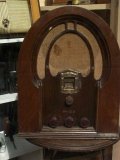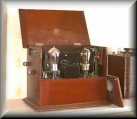INDEX
'Radio Drama - directing, acting, technical, learning & teaching, researching, styles, genres' site.
To WELCOME PAGE
|
|
|
|
|
|
|
|
|
|
|
|
|
|
|
|
|
|
|
|
|
|
|
|
|
|
|
|
|
|
See also Alan Beck's site on 'MAKING A RADIO SOAP (SERIAL DRAMA) - a fixed-end soap'
TECHNIQUES - FULL RANGE OF RADIO DRAMA TECHNIQUES ON THESE SITES
| A - RESEARCH |
| Analysing radio drama |
| Address - defines whom the speaker is addressing |
| Adaptations |
| Dialect or accent |
| Addition of extra sounds (speech problem) |
| Radio apparatus theory |
| Aurality as central to radio theory |
| Aural Paradise |
| Atmos - Darren Copeland's Ten Questions for a Listener - comments - learning about sound and listening |
| Aesthetics - the branch of philosophy that deals with the nature and value of art objects and experiences |
| Audiences - reception theory - the listener actively constructs a story from the fictional data provided by the radio play |
| Audiences - cognitive mapping - mental geography - navigating or orienteering through the fictional 'scenery' of radio drama - see Cognitive Mapping and Radio Drama by Alan Beck - Consciousness, Literature and the Arts, Volume 1 Number 2, July 2000 (on this site) |
| Acousmatic sound - sound events heard by the play characters, and by the listener, but not 'seen' - Point-of-listening 8 |
This is the 'Radio Drama - directing, acting, technical, learning & teaching, researching, styles, genres' site.
See also Alan Beck's site on 'MAKING A RADIO SOAP (SERIAL DRAMA) - a fixed-end soap'
To WELCOME PAGE
| Bibliography - Radio Drama Reading List |
| B - RESEARCH |
| Blind medium of radio - Point-of-listening in radio plays - Beck, Alan, 1998, Sound Journal 2.2 |
|
Blind medium of radio - Beck, Alan, 1999, 'Is radio blind or invisible? A call for a wider debate on listening-in', World Forum for Acoustic Ecology (WFAE), electronic publication, http://interact.uoregon.edu/MediaLit/WFAE/library/articles/beck_blindness.pdf |
| A - RESEARCH - Alan Beck |
| Alan Beck's Key Theories on Radio and Sound |
| B - SCRIPTS |
| Broadway (monologue script) |
| BBC |
| BBC Editorial Guidelines |
| See also Swear words - exclamations - profanities (SUBSTITUTES) |
| B - TECHNIQUE - PRODUCTION |
| Bed - atmos |
| Budgets - Pre-production |
| Back Story - characterisation |
|
|
|
|
|
|
|
|
|
|
|
|
|
|
|
|
|
|
|
|
|
|
|
|
|
|
|
|
|
|
This is the 'Radio Drama - directing, acting, technical, learning & teaching, researching, styles, genres' site.
To WELCOME PAGE
See also Alan Beck's site on 'MAKING A RADIO SOAP (SERIAL DRAMA) - a fixed-end soap'
See also Alan Beck's site on 'MAKING A RADIO SOAP (SERIAL DRAMA) - a fixed-end soap'
| F - FILMIC |
| Filmic - styles of radio drama directing and post-production which creatively relate to film |
| Filmic - Perspective explained by film shot analogy |
| Filmic - Close-up - making some dialogue section more intimate |
| Filmic - SOUND CENTRE - FIXED SOUND CENTRE - the centre of the sound picture remains fixed in the same place + MOVING SOUND CENTRE - 'we go with' |
| FILM - RESEARCH |
| Film - 'surplus of reality' - Point-of-listening in radio plays - Beck, Alan, 1998, Sound Journal 2.2 |
| F - RESEARCH |
| FORMALISM |
| Fictionalised sounds in radio drama - Darren Copeland's Ten Questions for a Listener - comments - learning about sound and listening |
| Figure-and-ground of dialogue - see 11.2 Linear - Cognitive Mapping and Radio Drama by Alan Beck - SECTION 11 |
| Frame limits of the radio play scene - see Point-of-listening 6 |
| F - PRE-PRODUCTION, PRODUCTION, POSTPRODUCTION |
| Files - Standardizing file names |
| Fallback - repairing problems in production |
| FEISTY GIRL - attractive, pushy, selfish, sexy, attacking, intelligent |
| F - SCRIPTS |
| Face it - monologue script |
| Gary Ferrington |
| Gary Ferrington, 'Keep Your Ear-Lids Open' Journal of Visual Literacy (1994) http://interact.uoregon.edu/Medialit/wfae/library/articles/ferrington_earlids.pdf |
| Gary Ferrington, 'Audio Design: Creating Multi-Sensory Images For The Mind', Journal of Visual Literary (1993) http://interact.uoregon.edu/Medialit/wfae/library/articles/ferrington_design.pdf |
| Gary Ferrington, 'Take A Listening Walk and Learn To Listen', http://interact.uoregon.edu/Medialit/wfae/library/articles/ferrington_listening_walk.pdf |
|
|
|
|
|
|
|
|
|
|
|
|
|
|
|
|
|
|
|
|
|
|
|
|
|
|
|
|
|
|
| Genre |
| Types of radio plays (genres) |
| Glossary |
| Get a new pair of ears to listen to your post-production work |
| Group dynamics - what goes right and avoiding the rest (RADIO SOAP SITE) |
This is the 'Radio Drama - directing, acting, technical, learning & teaching, researching, styles, genres' site.
To WELCOME PAGE
See also Alan Beck's site on 'MAKING A RADIO SOAP (SERIAL DRAMA) - a fixed-end soap'
| H - PRODUCTION |
| hook |
| Health and Safety |
| H - SCRIPTS |
| Hopes - monologue script |
| H - STUDYING PLAYS |
| John Dryden, 'Hotel Europa', 7-10-2000 and (repeated) 13-4-2001, B.B.C. R4, Friday Play 1 hour |
| Kate Adshead, 'Hanging', 20-9-2002, Friday Play 1', BBC Radio 4 |
| H - RESEARCH |
| Horizontal axis - Linear manner of broadcast - 11.2 Linear - Cognitive Mapping and Radio Drama by Alan Beck - SECTION 11 |
| Human-origin sounds, vocalised, non-vocalised - Darren Copeland's Ten Questions for a Listener - comments - learning about sound and listening |
|
|
|
|
|
|
|
|
|
|
|
|
|
|
|
|
|
|
|
|
|
|
|
|
|
|
|
|
|
|
See also Alan Beck's site on 'MAKING A RADIO SOAP (SERIAL DRAMA) - a fixed-end soap'
This is the 'Radio Drama - directing, acting, technical, learning & teaching, researching, styles, genres' site.
To WELCOME PAGE
See also Alan Beck's site on 'MAKING A RADIO SOAP (SERIAL DRAMA) - a fixed-end soap'
|
|
|
|
|
|
|
|
|
|
|
|
|
|
|
|
|
|
|
|
|
|
|
|
|
|
|
|
|
|
This is the 'Radio Drama - directing, acting, technical, learning & teaching, researching, styles, genres' site.
To WELCOME PAGE
See also Alan Beck's site on 'MAKING A RADIO SOAP (SERIAL DRAMA) - a fixed-end soap'
| quarter-layering - STYLISH SLIGHT REPEATING KEY PHRASES UNDER EACH OTHER (technique) |
| Use QUESTIONS - 'HOW DO I' - to navigate this site. |
| R - RESEARCH |
| RESEARCH - INTRODUCTION |
| radio drama - various techniques |
| Analysing radio drama |
| 'The Revenge' - radio play without words, written and performed by Andrew Sachs in 1978 |
| Radio theory - what is it for? |
| Realism |
| Radio drama dialogue is much more than the words on the page |
| Bibliography - Radio Drama Reading List |
| Radio apparatus theory |
| Radio theory is more than culturalism - see Radio theory - what is it for? What is it? |
| Master Narrative theorising (the flight from) - see Radio theory - what is it for? What is it? |
| What does radio theory deal with? - see Radio theory - what is it for? What is it? |
| Aurality as central to radio theory |
| Reception theory - RESEARCH INTO RADIO DRAMA - INTRODUCTION |
| Reception theory - Audiences (reception theory) |
| Reception theory - Cognitive Mapping and Radio Drama by Alan Beck - monograph - SECTION 3 and 3.2 'Radio Audiences' for cognitive schemata (Branigan) |
|
|
|
|
|
|
|
|
|
|
|
|
|
|
|
|
|
|
|
|
|
|
|
|
|
|
|
|
|
|
This is the 'Radio Drama - directing, acting, technical, learning & teaching, researching, styles, genres' site.
To WELCOME PAGE
See also Alan Beck's site on 'MAKING A RADIO SOAP (SERIAL DRAMA) - a fixed-end soap'
| T - TECHNIQUES |
| TECHNIQUES - FULL RANGE OF RADIO DRAMA TECHNIQUES ON THESE SITES |
| record 'umms' from all the characters to store |
| Underscoring music versus FXs |
| silences - different sorts |
| Silences and the overall design |
| Slurring and stuttering (vocal problems) |
| Swear words - exclamations - profanities (SUBSTITUTES) |
| Problem solving |
| Reverberation (echo) |
| SOUND CENTRE |
| Sound centre - see Point of listening = POL |
| Sound centre - see Perspective explained by film shot analogy |
| Sound centre - see Moving sound centre |
| Address - defines whom the speaker is addressing |
| Adaptations |
| Dialect or accent |
| Get a new pair of ears to listen to your post-production work |
| Group dynamics - what goes right and avoiding the rest (RADIO SOAP SITE) |
| Bed - atmos |
| Budgets - Pre-production |
| montage |
| Montage - definition and creative exercises |
| microphone positions |
| Moving sound centre |
| technique - 'moving camera' or 'we go with' or 'mise en scène' 'shot' |
| 'mise-en-scène' - techniques for the director to guide the listeners' perceptions |
| naming |
| Narrative |
| Narrator |
| Noise |
|
|
|
|
|
|
|
|
|
|
|
|
|
|
|
|
|
|
|
|
|
|
|
|
|
|
|
|
|
|
See also Alan Beck's site on 'MAKING A RADIO SOAP (SERIAL DRAMA) - a fixed-end soap'
| record 'umms' from all the characters to store |
| Underscoring music versus FXs |
| VOICE |
| Voice |
| Voice - Dialect or accent |
| V - RESEARCH |
| Vocabulary of sound - Darren Copeland's Ten Questions for a Listener - comments - learning about sound and listening |
| Visual - Oculocentrism or ocularocentrism (theory) |
| Visual - dominance of - Point-of-listening in radio plays - Beck, Alan, 1998, Sound Journal 4.2 |
| Visual - Dangers of visually-based theoretical terms (as 'image') - warning by Alan Beck |
| writing up your student project work (critique) |
| word lobby and the sound brigade |
| WELCOME PAGE |
| Wolves - The Company of Wolves |
| W - TECHNIQUES |
| 'We go with' - technique - 'moving camera' or 'we go with' or 'mise en scène' 'shot' |
| W - SCRIPTS |
| 'Warm Up Act' - training script |
| 'We go with - ' - training script |
| 'Wrap Pack' - Scenes 1-1-2, 1-1-4 one male, one female (Jack, Sarah) |
| 'Wrap Pack' 1-2-3 - two males (Jack and Colin) |
| 'Wrap Pack' 1-3-5 - two males, one female (Jack, Colin, Olivia) |
| 'Wrap Pack' 1-4-1 - one female, one male (Olivia, Colin) |
| 'Wrap Pack' 2.2.5 - Olivia + Jack + Colin |
| STUDYING INDIVIDUAL PLAYS |
| Gregory Whitehead, 'The Marilyn Room', broadcast 25-5-2001 and 11-10-2002, B.B.C. R4, Friday Play, 1 hour, directed by Gregory Whitehead |
| World Forum for Acoustic Ecology Online Reader, http://interact.uoregon.edu/Medialit/wfae/library/articles/ |
Z
|
|
|
|
|
|
|
|
|
|
|
|
|
|
|
|
|
|
|
|
|
|
|
|
|
|
|
|
|
|
|
|



